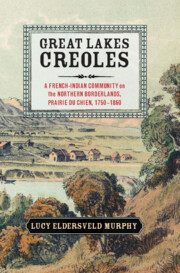Great Lakes Creoles: A French-Indian Community on the Northern Borderlands, Prairie du Chien, 1750–1860Posted in Books, Media Archive, Monographs, Native Americans/First Nation, United States, Women on 2016-06-08 15:17Z by Steven |
Cambridge University Press
September 2014
326 pages
25 b/w illus. 6 maps 7 tables
236 x 157 x 22 mm
Hardback ISBN: 9781107052864
Paperback ISBN: 9781107674745
eBook ISBN: 9781139990660
Lucy Eldersveld Murphy, Professor of History
Ohio State University, Newark
A case study of one of America’s many multi-ethnic border communities, Great Lakes Creoles builds upon recent research on gender, race, ethnicity, and politics as it examines the ways that the old fur trade families experienced and responded to the colonialism of United States expansion. Lucy Murphy examines Indian history with attention to the pluralistic nature of American communities and the ways that power, gender, race, and ethnicity were contested and negotiated in them. She explores the role of women as mediators shaping key social, economic, and political systems, as well as the creation of civil political institutions and the ways that men of many backgrounds participated in and influenced them. Ultimately, The Great Lakes Creoles takes a careful look at Native people and their complex families as active members of an American community in the Great Lakes region.
- Builds upon recent research in gender, race, ethnicity, and politics
- Connects American Indian history with major historical themes
- Examines Native people and their complex families as active members of an American community in the Great Lakes region
Table of Contents
- List of Tables
- List of Figures
- Acknowledgments
- Introduction
- 1. ‘The rightful owners of the soil’: colonization and land
- 2. ‘To intermeddle in political affairs’: new institutions, elections, and lawmaking
- 3. ‘Damned yankee court and jury’: more new institutions, keeping order and peace
- 4. Public mothers: women, networks, and changing gender roles
- 5. ‘A humble type of people’: economic adaptations
- 6. Blanket claims and family clusters: autonomy, land, migration, and persistence
- Conclusion
- Epilogue
- Index




